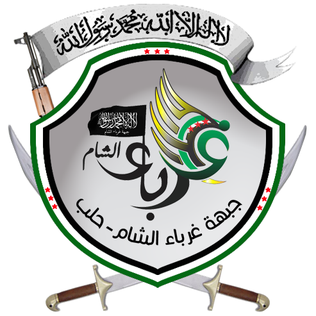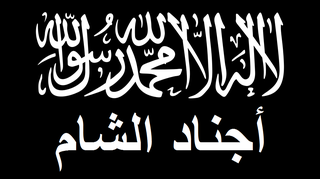See also
- All pages with titles containing Ghuraba
- Ghurabah, a place in Yemen
Ghuraba may refer to:

Ali ibn al-Husayn al-Iṣfahānī, also known as Abul-Faraj, was a litterateur, genealogist, poet, musicologist, scribe, and boon companion in the tenth century. He was of Arab-Quraysh origin and mainly based in Baghdad. He is best known as the author of Kitab al-Aghani, which includes information about the earliest attested periods of Arabic music and the lives of poets and musicians from the pre-Islamic period to al-Isfahani's time. Given his contribution to the documentation of the history of Arabic music, al-Isfahani is characterised by Sawa as "a true prophet of modern ethnomusicology".
Islamic Jihad may refer to:
Liberal or liberalism may refer to:
Symbolism or symbolist may refer to:
Anti-Islam or anti-Muslim may refer to:

The Mujahideen Shura Council (MSC), was an umbrella organization of at least six Sunni Islamic insurgent groups taking part in the Iraqi insurgency against U.S. and coalition and Iraqi forces: Tanzim Qaidat al-Jihad fi Bilad al-Rafidayn, Jaish al-Ta'ifa al-Mansurah, Katbiyan Ansar Al-Tawhid wal Sunnah, Saraya al-Jihad Group, al-Ghuraba Brigades, and al-Ahwal Brigades.
Islamic civilization may refer to:
Ghuraba or Al-Ghurabaa is an Islamic eschatological epithet mentioned in the hadith that vicariously describes the manner in which upright Muslims are perceived by the wider society. The term Ghuraba literally means strange or weird.

Ghuraba was a Palestinian Arab village in the Safad Subdistrict. It was depopulated during the 1948 War on May 28, 1948, by the Palmach's First Battalion of Operation Yiftach. It was located 22 km northeast of Safad.
Islam and slavery may refer to:

The Battle of Ras al-Ayn was a series of armed clashes for control of the town of Ras al-Ayn during the Syrian Civil War, mainly between the Kurdish-majority People's Protection Units (YPG) and an alliance of Syrian rebel groups, with the occasional involvement of the Syrian Armed Forces. As result of the battle's first phase, the Syrian Army was expelled from the city by Syrian rebels, whereupon the latter attacked the YPG-affiliated fighters in Ras al-Ayn. In the following months, the city was effectively divided into rebel-held and YPG-held areas, with intermittent fighting resulting in the gradual expansion of the YPG's territory in the city and its surroundings. Islamist and jihadist factions soon became dominant among the rebels in the region, further contributing to tensions with the secular-leftist YPG. In July 2013, the battle's final phase erupted and ended when an alliance of YPG-led troops completely expelled the rebels from Ras al-Ayn.
Ghuraba al-Sham was a group of jihadists of Turkish and former Eastern bloc origin who smuggled foreign fighters to Iraq, intervened in Lebanon during the 2007 Lebanon conflict, and fought in Syria during the Syrian civil war. The group coordinated with Al-Nusra Front in clashes with the People's Protection Units in November 2012 and in January 2013. The group apparently shut down or disappeared in 2014.

The Ghuraba al-Sham Front was a group of fighters, active during the Syrian civil war, in favor of a secular state. The group formerly had around 2,000 men, but in May 2013 it clashed with Islamic fundamentalist groups and most of its fighters dispersed. Ghuraba al-Sham's arsenals were confiscated by the Islamists and by late 2013 it had only has around 100 fighters in its ranks. The group consisted of a mixture of secularists and Islamists. The name of the group has since changed. There was a battalion within the group called the Loyalty Battalion made up entirely of women.

The Ajnad al-Sham was an independent Idlib and Hama-based rebel group active during the Syrian Civil War. The group is named after Ajnad al-Sham. It joined the Army of Conquest on 24 March 2015 and took part in the Second Battle of Idlib. On 29 March 2014, it announced that its military leader, Abu Abdullah Taoum, was killed during clashes around al-Fouaa.
2013 was the year in which the jihadist group Islamic State of Iraq and the Levant adopted that name. The group expanded its territorial control in Syria and began to do so in Iraq also, and committed acts of terrorism in both countries and in Turkey.
Fascism is a political ideology.

The Raqqa campaign (2012–2013) was a series of battles and offensives launched by various Syrian rebel groups, led by the al-Nusra Front, against Syrian government forces in the Raqqa Governorate as part of the Syrian Civil War. The campaign was launched at the second half of 2012 and ended in the capture of the city of Raqqa as well as dozens of smaller towns and facilities.
Madrassa Shahi is an Islamic seminary in Moradabad, Uttar Pradesh. It was established in 1879 by the poor Muslims of Moradabad under the supervision of Islamic scholar, Muhammad Qasim Nanautawi, who also established the Darul Uloom Deoband. This started as Madrasatul Ghuraba, but gained recognition as Madrasa Shahi. Its first principal was Ahmad Hasan Amrohi.
Firqat al-Ghuraba is an active jihadist group aligned with al-Qaeda based in opposition held areas in the Idlib Governorate in northwestern Syria. The group mostly consists of foreign fighters from Europe with many, including the group's leader, originating from France and Belgium. The group is also believed to have sworn allegiance to al-Qaeda.